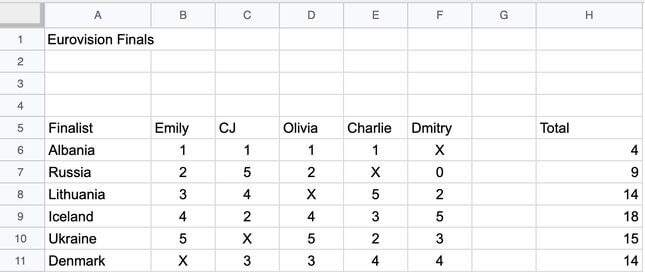
Illustration: Elena Scotti
Much like cricket or monarchy, the Eurovision Song Contest is a European tradition that Americans can appreciate from afar but never truly understand. Perhaps it is this elusive Europeanness that makes me, along with my friends, anticipate it every year with a fervor matched only by excitement over the premiere of a new season of The Great British Bake-Off.
Like Bake-Off, Eurovision is a low-stakes competition where the prize is a job well done: just as the winner of Bake-Off walks away with only a cake plate to show for the achievement, the winners of the Eurovision Song Contest get a glass microphone trophy while their country gets the chance to host the competition the next year. And in a country where even our shittiest celebrities get at least a Quibi deal for very minimal effort, and our reality competitions generally include at least a hundred-thousand-dollar prize, watching a lot of people try really hard once a year simply for the sake of trying really hard has long been a balm for mine and my friend group’s anxieties, completely frayed by the American exceptionalist competitive spirit that has resulted in our citizens electing a jingoist bullhorn and former reality TV host in place of a president.
In light of covid-19 and global stay-at-home orders, our beloved Eurovision has been canceled, though countries will have the option of either sending their contestants next year or choosing a new song. And so in true American spirit, three of my friends, along with my boyfriend and I, decided to ruin a perfectly good European tradition by embracing it and declaring a winner among ourselves.
The babushkas are not outliers, all of Eurovision is this fucking glorious.
For the uninitiated, here are the rules to Eurovision as best I understand them (which is to say not really at all): Each year, as many as 44 countries (the number fluctuates) submit one song to the Eurovision Song Contest presented by the European Broadcasting Union (EBU). Those countries are mostly European but include Australia and Israel, apparently, just because why the hell not. There are two rounds of semi-finals before a final in which five nations—Spain, France, Germany, Italy, the United Kingdom—buy their way straight to the big show by virtue of yearly donations to the EBU. The host country (the previous year’s winner) is also guaranteed a spot. The outcome of the contest is based on a combination of audience votes in addition to the votes of each country’s pre-selected juries and has nothing to do with the goodness of a song and everything to do with international rivalries and grudges.
Furthermore, the rules are constantly in flux and change from year to year amid much yelling and protest, and the performances can be in any language including made-up languages created just for the contest songs. Performers must sing live but, for some reason cannot play instruments and so make up for this lack with blinding light shows or, as in the case of Russia’s 2012 entry, a stage full of grandmothers baking bread and singing what seems to be a folk song to an EDM beat. The babushkas are not outliers, all of Eurovision is this fucking glorious.
In true Eurovision fashion, my friends Charlie, C.J., and Olivia, my boyfriend Dimitry, and I changed the rules no less than five different times over the course of deciding a Eurovision winner, we all played moneyball with our selections, and no one was happy with the outcome.
Here were our rules: each of us chose three finalists, and from those finalists, we all put forth one song for the final round. Iceland’s breakout banger “Think About Things” proved a challenge since it was in three of our top threes. My solution was to put the song in the finals as the world’s champion. We could not vote for the song we put forward and ranked the other songs on a scale of 5-1. Below are our chosen songs, final tally, and winner.
Albania – “Fall From the Sky”
It feels obvious to say this, but the X factor here is Arilena Ara’s voice. In my opinion, there is no one in the contest this year who can match her vocal quality. It’s not just that she can belt, she has total control of her voice as an instrument. I sincerely believe she could break down the walls of Jericho just as easily as she could make a lucrative career as a YouTube ASMR star. —DimitryDenmark – “Say Yes”
I will admit that my reasons for choosing Ben & Tam’s “Say Yes” were not nearly as pure as those of my friends and fellow Eurovision fans. My first choice was Sweden’s “Move,” but Denmark made both Charlie and my top three, which made me think it would get high marks from him, and I hoped Charlie’s preference, coupled with the fact that most people don’t have any beef with Denmark as a country, might be enough to push my song to the top. Because ultimately, Eurovision is not about creating a great song, as many, many years of terrible songs would teach us, but about winning and dominating the other countries.That being said, “Say Yes” is an incredibly catchy tune that I still find myself humming nearly every day. Those two kids singing it have undeniable charm, the melody has a really uplifting Mumford and Sons vibe, and I love the backup singer’s bangs and skinny tie tuxedo combo. If Eurovision 2020 actually happened and Denmark won, my reaction would be, “Aw, good for them,” which is all I really ask. —Emily
Iceland “Think About Things”
Just watch, you’ll see its merits. —Everyone except for C.J., who does not see its merits.Lithuania “On Fire”
This had everything I love in a Eurovision song: basic/baroque lyrics that feel anthemic but are, on even vaguely close inspection, insane, delivered with super mannered, possibly phonetic vocals; a really low-tech but still batshit video concept; joyful androgyny expressed in a dance routine that anyone could participate in, regardless of talent level. I don’t know from personal experience what Eurovision was like before the YouTube era, but I know that irony is poison, so I appreciate that whatever the Roop is doing, they are doing it earnestly and on purpose. It feels like they are trying to be universally cool/accessible without having hired anyone to research what that meant, algorithmically (ahem: Iceland, Russia).This was not part of why I recommended it, but I also just learned that a) this song is about rejecting ageism, and b) the dance moves have names (these are official and come from the band):
MOVE 1 “On Fire!” – I am on fire! (Hands crossed over the back of the head with fingers stretched)
MOVE 2 “Stretch!” – I am stretching out and warming up. (Outstretching arms to the sides)
MOVE 3 “Focus!” – I am focusing and concentrating. (Hands on the sides of the head)
MOVE 4 “Make Room!” – I am making more room for myself to move on. (Swinging arms to the sides and over the head)
MOVE 5 “Shake It Off!” – I am shaking off all stereotypes and biases. (Dusting yourself off) —Olivia
Russia “Uno”
Russia’s entry, “Uno,” from the rave band Little Big, was my selection because it’s working deep into the territory of the most exciting Eurovision entries, taking itself simultaneously very seriously, but also with a wink and a nod, which takes the edge off. It’s hard to know exactly whether they’re conveying some authentic contemporary encapsulation of contemporary Russian-ness, or just having us on, but either way, they’re really enjoying themselves, and they’re not half-assing it. Moreover, in essential Eurovision style, it’s a full performance.One could listen to the song alone, I suppose, but it would deprive them of the poppy pastels interspersed with dangerous totems (lead singer Ilya Prusikin’s tattoos through his sheer disco shirt, backup singer Anton Lissov’s thick black lip liner, and guest vocalist Florida Chanturia’s deadly [or is it just bored?] gaze). But all senses of danger are undercut again (Lissov’s Adidas platform heels, or the sheer inanity of the song, in which the seven Russians count to six over and over again). It’s possible their clear intention to fuck with us will make some feel like they’re trying too hard, but I think they’re trying too hard in exactly the right direction. —Charlie
Ukraine
This song has an amazing beat, a gymnastically executed vocal chorus, and a fucking… panpipe?.. .really what is that?… solo as the intro and refrain (I guarantee you someone in America is going to steal and sample and make famous in like one minute)—all of which rules. Taras Shevchenko is the lead singer and she is simultaneously a boss, and expressive, and wearing a Met Gala-worthy outfit. This is a person so in command of the stage that I did not notice that her guitarist (bassist? It’s dark up there) had SPARKS FLYING OUT OF THE HEAD OF HIS INSTRUMENT until the fifth time I watched the video because I could not take my eyes off of her.Perhaps more importantly, she’s doing that thing that I always think about in art where she’s taking from her own cultural past and trying to figure out how it makes sense to her now and how it does or doesn’t speak to people now and responding to it so we carry the good bits of our cultures forward without pretending we live in the past. The performance is clearly proud of Ukraine without feeling nationalistic or reductive (Monsieur qui filmed his video in the Eiffel tour, je te vois). Also, it’s like, hey, did you think you DIDN’T like folk music about having a tryst in a grove with Vatruisa and also fucking nightingales and your own human heart? Because watch the video and it’s like WHAT ABOUT NOW. —C.J.
The Final Tally

Because four out of our group of five have advanced degrees in English, we are decidedly not a numbers-savvy bunch and obviously did not see the folly in letting Iceland have five votes rather than four (though the one of us who has two degrees in political science probably could have mentioned the dumbness of our English major voting system). Also, some of us gave low or no marks to Russia for political reasons despite the obvious merits of their video. So the runaway winner was Iceland because the system wasn’t fair, which, in the grand Eurovision tradition, seems right.